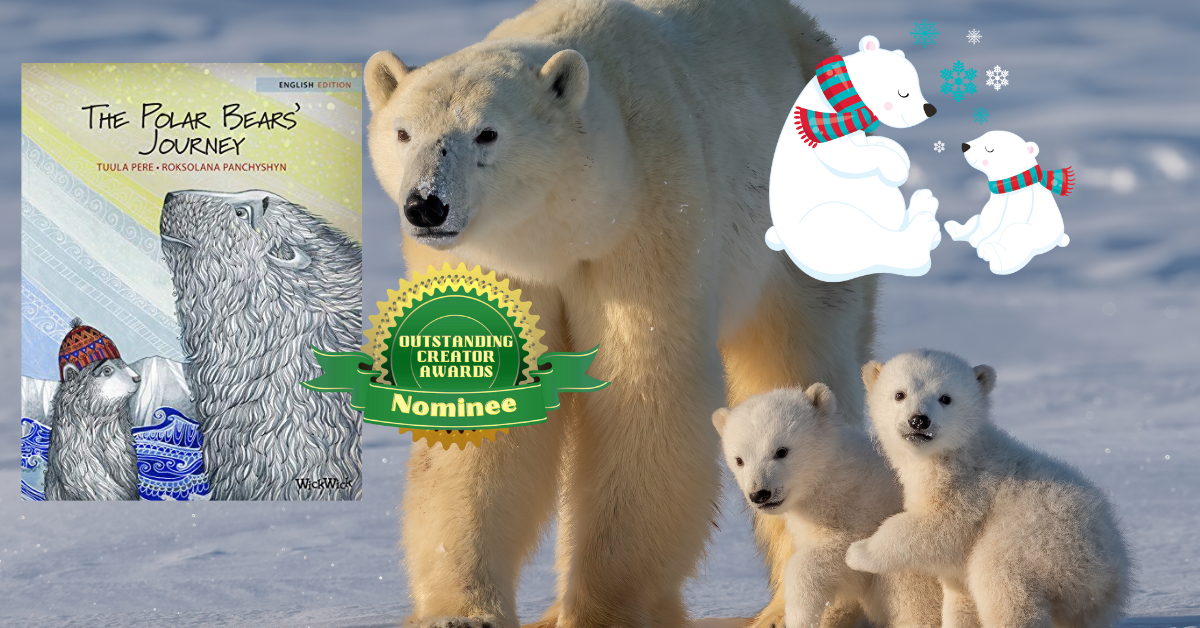|
Score: 92/100 (9.2 out of 10)
The Polar Bears' Journey is another moving and emotional children's book by Tuula Pere that addresses two major issues: the withering away of a specie's natural habitat and parental love (particularly maternal love). Tuula Pere is one of our best and most prolific children's authors along with Anna Finch and Once Upon a Dance. The shear range and variety of her children's books is mind-boggling. One thing is for certain: Tuula Pere isn't afraid to get a little darker and explore slightly less cheerful themes. That's not to say that there's death or violence in this book, no. This book is clean. It's more so that the tone of this book seems grimmer, darker, and more desperate. It is very clear that these polar bears are struggling to find both food and shelter as well as each other. So, the peril seems real. Most of this book consists of the mother bear finding food for the baby bear (named Nanu) and bringing Nanu on a journey to find his dad, who has been missing for days on a hunting trip. Along the way, they receive assistance from a kind and capable bird called a tern or “path finder bird” who becomes a helpful friend. It is a little bit strange that the “tern” is mentioned briefly with very little explanation of who or what it is and is not shown on a page until about the third time its mentioned. So, we had to look it up on Google. But it wasn't the biggest deal. There's something very niche and unique about this art style. It can seem a bit warped and wonky at times. It has a very hand-drawn, penciled-in look, which has a niche appeal. It's a matter of taste. The colors are subdued and dark—dark blue, dark green, dark yellow, dark red—perhaps best exemplified by Nanu's snow hat and the fishes. It reminds us of lapis lazuli. In fact, that might be the best analogy for the way the art appears. The story itself is captivating and quite tragic. Again, no, there is no death (except the implication that they ate the fish off-page as polar bears do), but it is a bit sad to see that the bears have so little to eat and that they keep running out of land to live and move on. That's the point. Perhaps this book could be used to teach slightly older children about the problems caused by global warming and urbanization (leading to deforestation and loss of habitat). In that sense, it reminds us of The Lorax by Dr. Seuss, at least in terms of its message. This book does seem to end on a hopeful and optimistic note. Teachers and parents may be able to talk to children about some of the issues this book explores. As mentioned, it's also a powerful story about a mother's love as the mother bear is constantly sacrificing to feed and take care of Nanu, even offering to let him ride on her back when he's tired of swimming and to let him eat the only fish. It's also a powerful illustration of a father's love, although he's not physically present much in the book. That's kind of the point. The father bear loved his family so much that he was willing to risk his life, comfort, and safety to find them food every day. That's a lot like what parents go through in real life. Parents are constantly giving up their own time, energy, and comfort for their children. So, there's a lot of beauty to be found in this book. Check it out on Amazon!
0 Comments
Leave a Reply. |
Archives
July 2024
Categories |

 RSS Feed
RSS Feed